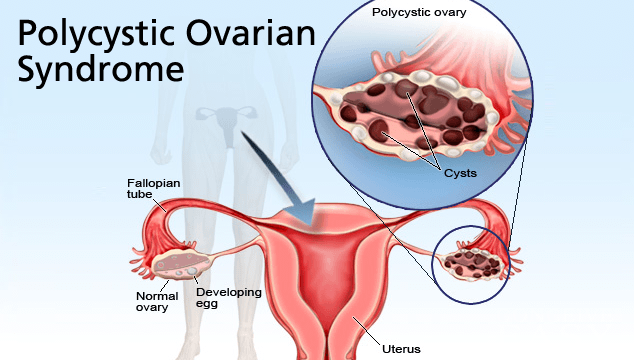If you suspect that you are suffering from PCOS (Polycystic Ovarian Syndrome) because you are experiencing symptoms like infertility, irregular, and infrequent menstrual cycles and acne, you need to truly understand what this condition means and how you can deal with it so that it does not affect your fertility. Claim Your 20 Free Pregnancy Tests – Click Here

Many women who hear about Polycystic Ovarian Syndrome (PCOS) think about huge cysts on the ovaries. The truth is that PCOS is characterized by multiple, small cysts that appear like black dots on an ultrasound screening. Women who suffer from this condition are not able to produce enough hormones to determine the follicles that contain their eggs to mature.
Normally, a woman produces several follicles during the first half of her menstrual cycle, each follicle containing an egg. Only one follicle will remain and produce an egg during ovulation, and when the egg will mature the woman’s LH (luteinizing hormone) levels will surge and cause the matured egg to burst from its follicle.

However, Polycystic Ovarian Syndrome affects the woman’s capacity to produce the necessary hormones that trigger ovulation. So, her follicles do not mature, but instead, collect fluid and grow, sometimes developing into cysts. Since you are incapable of ovulating, your body will not produce progesterone. Progesterone is the hormone that causes the lining of your uterus to thicken. Without progesterone, your cycles become irregular or even absent. Other symptoms of PCOS are pelvic pain, thinning hair, obesity and increased hair growth on your face, back and chest.

PCOS causes your body to produce excessive insulin, and, as a response to this, produces high levels of male hormones. It is this excess of male hormones that affect your production of female hormones and makes you incapable of ovulating. If you do ovulate, it is very hard to figure out when this happens, so it is very hard to plan a pregnancy. Ovulation prediction kits may not work for you because they will not be able to correctly detect LH surges if your LH levels are elevated, which happens sometimes in women with PCOS.

Some infertility treatments that may work for you are: in vitro fertilization; Metformin (which helps your body use insulin better so you will not need it in a big amount in order to control blood sugar levels); fertility drugs that block estrogen receptors in your brain, causing your body to think it must produce more FSH (follicle stimulating hormone) and LH, which will help you ovulate; or ovarian drilling- which will actually destroy a small portion of your ovary in order to lower androgen levels and help you ovulate normally. Weight loss may also help by balancing your hormone levels. Your doctor can help you figure out what the best treatment for you is, whether you are trying to get pregnant now or later.










Comments